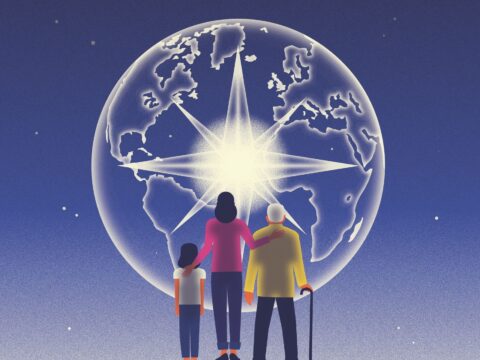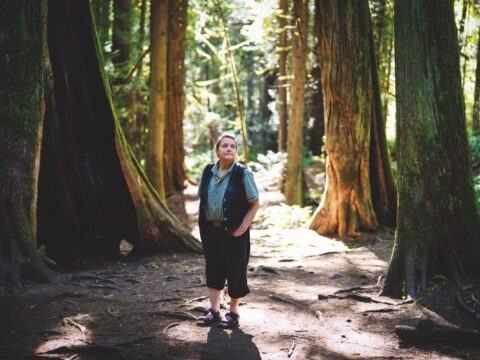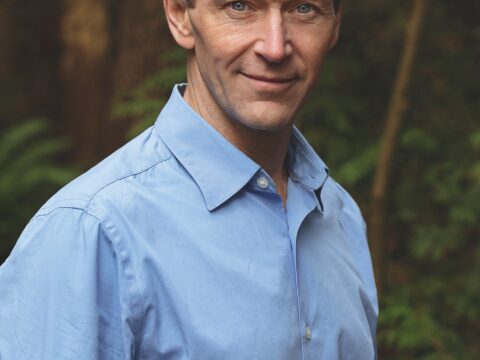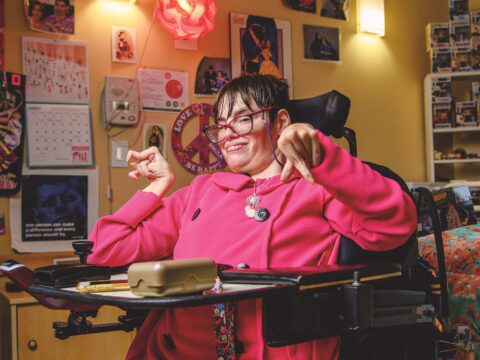In my late teens, when I reaffirmed my Catholic faith, I devoured The Road to Damascus. This now out-of-print essay collection featured stories from famous 20th-century Catholic converts like Evelyn Waugh and Clare Boothe Luce, and I loved them for their decisiveness. Converts often write with such confidence because they speak from the mountaintop, surveying the path behind them as if they’ve already reached the finish line.
Over time, though, I outgrew the conversion narrative as a genre. When I felt myself growing spiritually restless, I wanted to hear from other people who were wandering like me, searching for God in the unexplored wilderness with no promising destination in sight. I sought out strangers outside my church, on their own spiritual journeys, and I asked for their stories.
It may sound trite for me to say that what I heard changed me. The sharing of words between persons, the everyday use of language, is so ordinary that I’m not always conscious of its sacred power. Asking someone to tell you their story is to invite echoes of the work of our Creator. It’s an intimate, immediate encounter, quite different from reading the edited life of a stranger in a book. I now believe that these unpolished spoken stories make much better sustenance for the ongoing spiritual journey. But it took time and a lot of listening to change my mind.
When I first swapped conversion narratives for occasionally awkward conversations with strangers, I struggled to accept the latter’s lack of an ending. I was unconsciously looking for a resolution or even a moral — something that might offer me the clarity I’d previously found in conversion stories. I talked to a varied group: Christians, ex-Christians, agnostics, the devout, the unaffiliated. Each storyteller was seeking the Divine in some way, but no one could present me with a conclusion for their life’s meandering path. Their stories were given without any pointed literary significance, without catharsis or ending — they just were.
One woman, who was raised Catholic, told me her story of encountering racism in multiple churches and denominations, and of leaving congregations behind to chase God on her own. She has found this path lonely but doesn’t want to return to community, which for her has been an experience of shame and exclusion. She explained her spiritual journey to me with a striking metaphor: elements of her life needed to be pruned away because they weren’t nourishing her in the first place. This process has brought both pain and profound healing, but no resolution. There’s no clear end to her search; she’s still sitting in the loneliness and seeking God therein.
More on Broadview:
- As a Black immigrant, I’m constantly reminded I don’t belong
- She felt disconnected from Christ. Outdoor church brought her back.
- I was devoted to Mars Hill Church pastor Mark Driscoll’s sermons — now I’m a proud feminist
On the other hand, a man rediscovered Christianity in the Episcopal Church after leaving behind his Baptist upbringing for neopaganism during university. His reversion wasn’t an arrival but a departure into new searching. After returning to Christianity, he suffered clerical abuse in the church that had initially welcomed him. He also discerned his own vocation to the priesthood, a choice that provoked criticism because of his young age in an older congregation. He speaks of the cross of Christ as the still point around which the chaos in his life turns. He hasn’t found his church to be an entirely safe spiritual home yet, but he describes it as a place where he can be in the presence of God and cry, suffering with Christ while keeping his eyes fixed on him.
I found there was surprising poetry in the lack of resolution in these stories. There is beauty to be found in relentless seeking, in the recognition of oneself as an incomplete mystery chasing a mysterious God. Evelyn Waugh and his cohort of converts, with their tidy, inspiring stories, served an initial purpose in affirming my reversion. Ultimately, hearing from fellow sojourners helped me accept my own spiritual journey as an ongoing narrative lacking a neat conclusion.
Through these conversations, I also realized the shallowness of my desire for literary closure and moral satisfaction in the midst of life’s pilgrimage. The real gift of this life, here and now, is its reality as a story with an unknowable end. As we constantly tell and retell our life’s narratives, we are surprised again and again by the Author who is love.
I find solace now in a new kind of food for the journey. There’s no narrative closure to be found in untidy, incomplete, but no less sacred stories of people walking the winding earthly road to God. When our faith begins to flag, or when we find perfectly complete stories disheartening, we can look to fellow travellers alongside us on the path, and ask for their evolving grace-filled stories as sustenance.
And what is the act of faith, after all, if not belief in stories passed on? Every story I have ever loved is made up of words — the most common and priceless of gifts we can give to one another. Words are the food and nourishment of faith, and they ultimately point to that one old, infinitely lovable story, of the Word who became flesh and entered time for you and me.
***
Marie Trotter is a writer, poet and playwright from Toronto. She is a PhD student in literature and theatre at McGill University in Montreal.
This story first appeared in Broadview’s December 2021 issue with the title “Unfinished Stories.”
















If we are all on a “spiritual” journey, how can we come to the conclusion? That implies the journey is done.
If Christians are on a journey, we will never reach the end of it, if we truly believe we will live for eternity. (Philippians 3:14)
The trick is, is the journey on a narrow path, or on the broad way? (Matthew 7:13-14)
For me, each journey is unique and that’s why religion often fails to satisfy the hunger for God. As Christians, raised in Christian societies we cannot shake ourselves of our roots but I learned at an early age that every culture has its broad religious beliefs that come from one described as a prophet or some manifestation of God. And, each one thinks that their way of believing is the “right” way and they will point to their holy writings to prove their point. Religion is rigid. It has rules and set prayers and songs and ways of worship which I find to be constricting.
I find that the concepts of love and forgiveness and understanding only operate within a religion to a point. Step too far outside the norm, as some people have and one finds oneself on the outside of the community.
Spirituality, however, is freeing. I am free to open myself to God in whatever way God presents God’s self to me. There is nobody to judge me, there is no rigidity, there is a feeling of love and it is self-love, the feeling that I am OK. I don’t have to believe in ancient writings from people of a different time and place and culture and understanding. I have my own experience and they had theirs and mine is just as valid for me as theirs was for them.
I made a deal with God one time as I knelt at the front of a little church that if God was real and really existed then I would give my life to (at the time) Him and go where he wanted me to go and do what he wanted me to do. Looking back I can see where I was led on a fantastic journey; one filled with pain and joy, of uncertainty and wonder, of education and ministry and more education and to the love of my life who is the embodiment of God to me. But I also discovered that I do not fit a mold. I have my own concept of God that works for me. I have experienced and do experience answered prayer. I experience wonder and joy and much love and I don’t have to follow the rules or read the prayers. I have my own. And I discovered that when they taught me in seminary to think critically, they only meant that to a point. I have gone beyond that point and the journey is truly wonderful. As Gretta Vosper once said, “God is real but not what you think.
When we seek spirituality rather than religion, we grow. Each person’s journey is unique but growth requires an open mind, fearlessness and determination as well as opening of one’s self to the spirit or, if you like, the quantum field of unlimited possibilities.